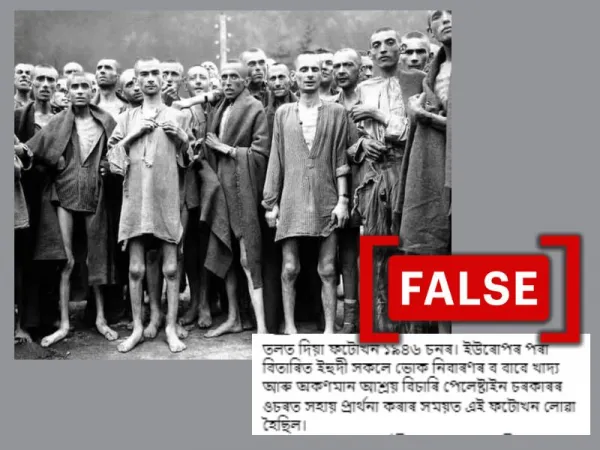By: Anurag Baruah
November 8 2023
 Screenshot of Facebook post falsely claiming that the photo shows Jews requesting help from Palestine. (Screenshot/Facebook/Modified by Logically Facts)
Screenshot of Facebook post falsely claiming that the photo shows Jews requesting help from Palestine. (Screenshot/Facebook/Modified by Logically Facts)
This photo does not show Jews asking for help from Palestine but actually shows prisoners in an Austrian Nazi concentration camp in April 1945.
More than 10,000 people in Gaza and around 1,400 people in Israel have died in the ongoing Israel-Hamas conflict, that began on October 7. Social media is awash with photos and videos being shared with false and misleading narratives, with some extending beyond the present war in Gaza and delving into the history of Israel-Palestine.
What is the claim?
Amid this, a black and white photo depicting a group of emaciated men standing together and looking at the camera has gone viral on social media, especially in the Indian regional language of Assamese, along with a few English posts. The claim accompanying this photo suggests it was taken in 1946 and portrays 'Jews deported from Europe asking the Palestinian government for help in finding food and shelter to satisfy their hunger.' Several Facebook profiles have recently shared the photo with a similar caption. You can view an archived version here.
Screenshots of Facebook posts claiming that the photo shows Jews deported from Europe asking the Palestinian government for help. (Source: Screenshots/Facebook/Modified by Logically Facts)
However, the photo actually dates back to April 1945 and portrays prisoners at a Nazi concentration camp in Ebensee, Austria.
What are the facts?
After conducting a reverse image search, we found the same photo captioned as, "Prisoners pose in liberated Nazi concentration camp" on the official website of the Truman Library, a Presidential Library administered by the National Archives and Records Administration, a U.S. federal agency.
The website entry describes the photo as: "Starved prisoners, nearly dead from hunger, pose in Nazi concentration camp in Ebensee, Austria. In the Austrian Alps the Nazis had one of their largest camps. Large numbers of inmates were starving to death and dying at the rate of 2,000 per week. The camp was reputedly used for 'scientific' experiments. It was liberated by the 80th Division, 3rd U.S. Army.” The photo has been dated April 1945 on the website, and the United States Army Signal Corps has been credited for the same.
Screenshot of the photo on the Truman Library website. (Source: Screenshot/Truman Library)
The Times of Israel also published the same photo, dated May 7, 1945, and captioned it as, "Starved prisoners, nearly dead from hunger, pose in a concentration camp in Ebensee, Austria." This photo was featured in an article published on May 31, 2023, titled 'Jewish doctors’ secret study of Warsaw ghetto starvation rediscovered 80 years later.' The Atlantic also included the photo in a photo essay titled "World War II: The Holocaust" on October 16, 2011, with a similar caption.
It is well-documented that Jewish immigration to Palestine began in the 1200s and escalated following religious persecution across Europe around the turn of the 19th century, continuing through 1922-1947. While such immigration of persecuted Jews to Palestine did occur, there is no credible report associating this photo with Jews deported from Europe asking the Palestinian government for help.
The verdict
Although substantial Jewish immigration to Palestine to escape Nazi persecution did happen, the viral photo does not depict deported Jews seeking help from the Palestinian government. The photo, in fact, portrays prisoners at a Nazi concentration camp in Ebensee, Austria, in 1945. Therefore, we have classified the claim as false.